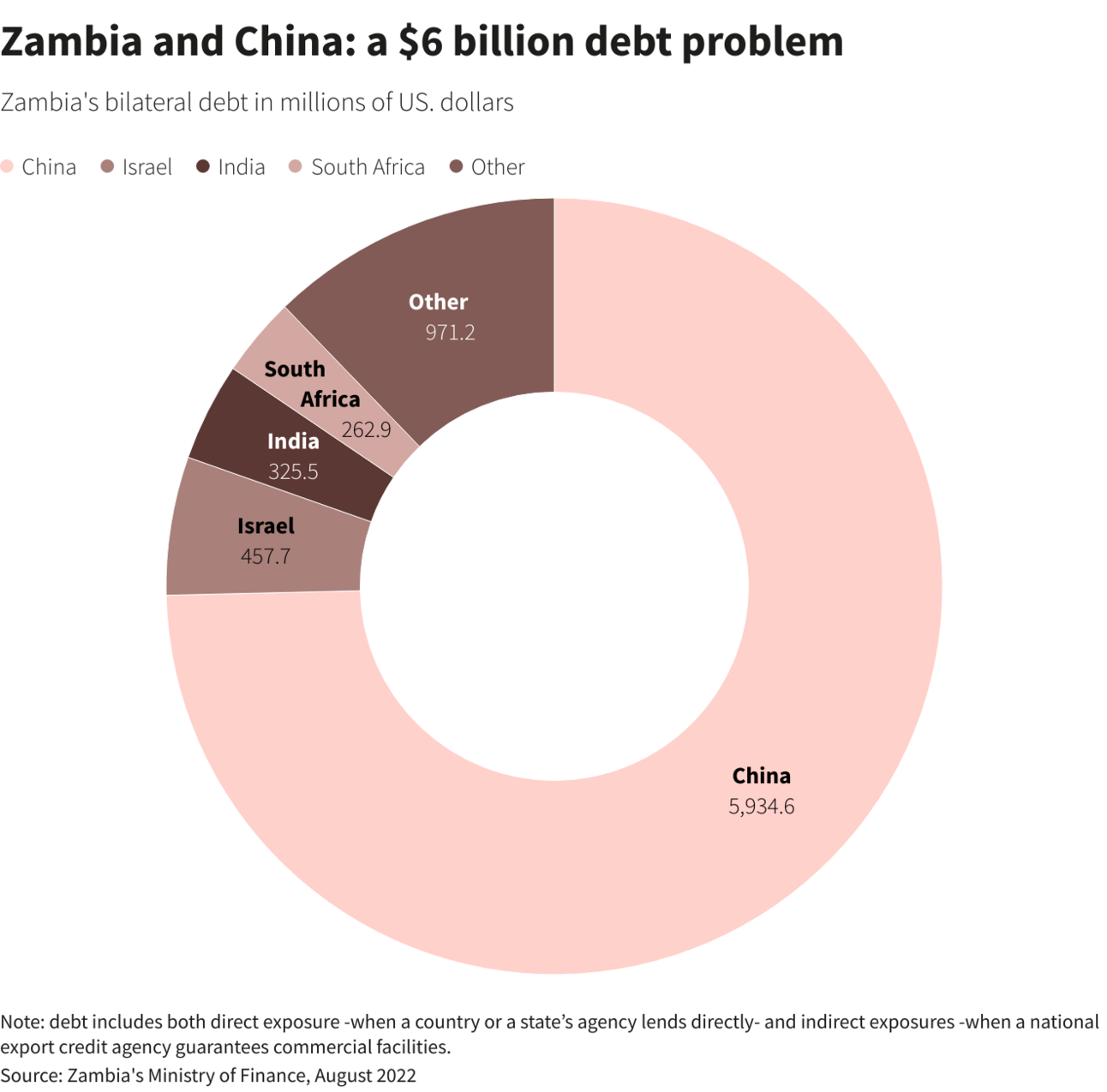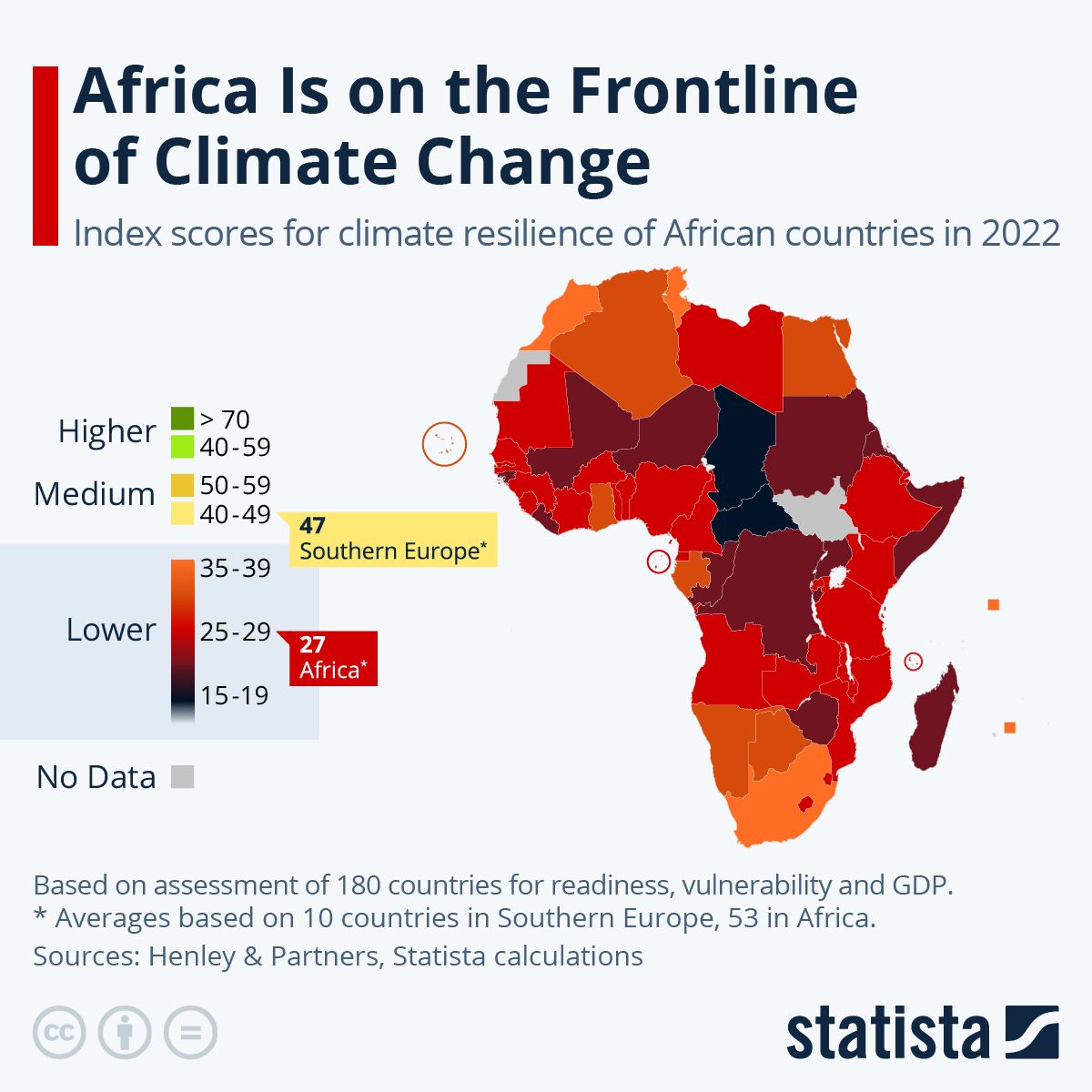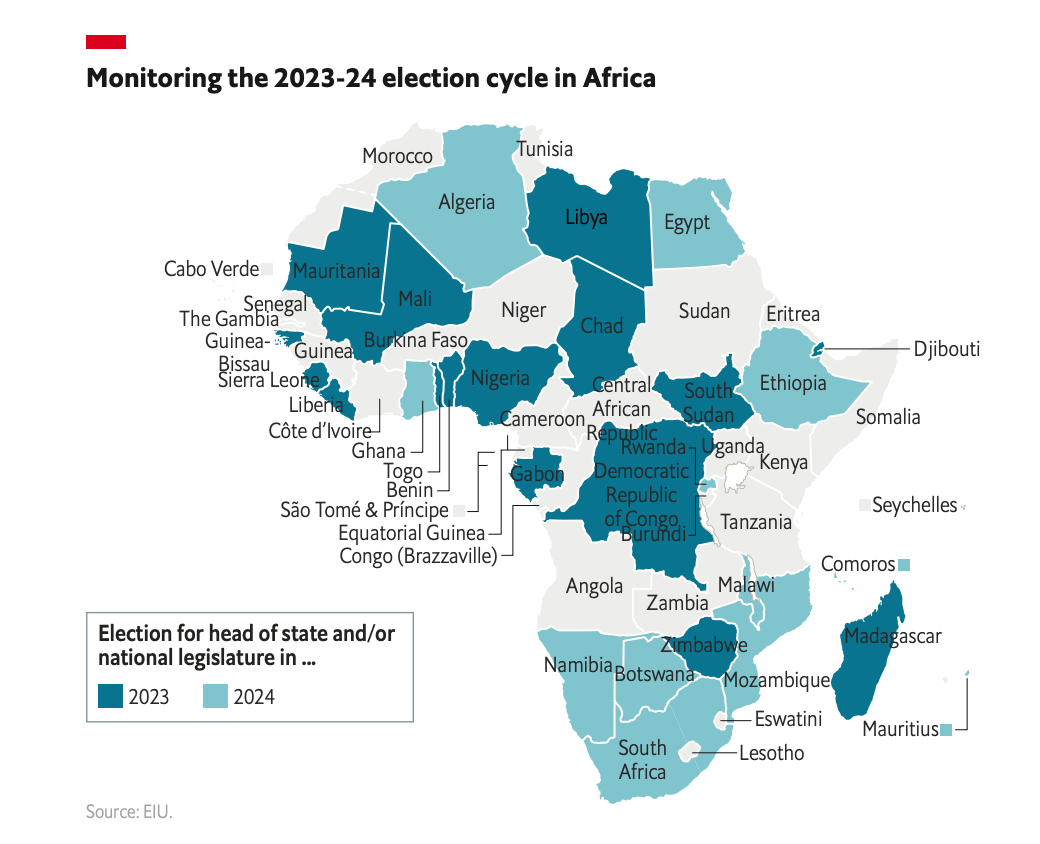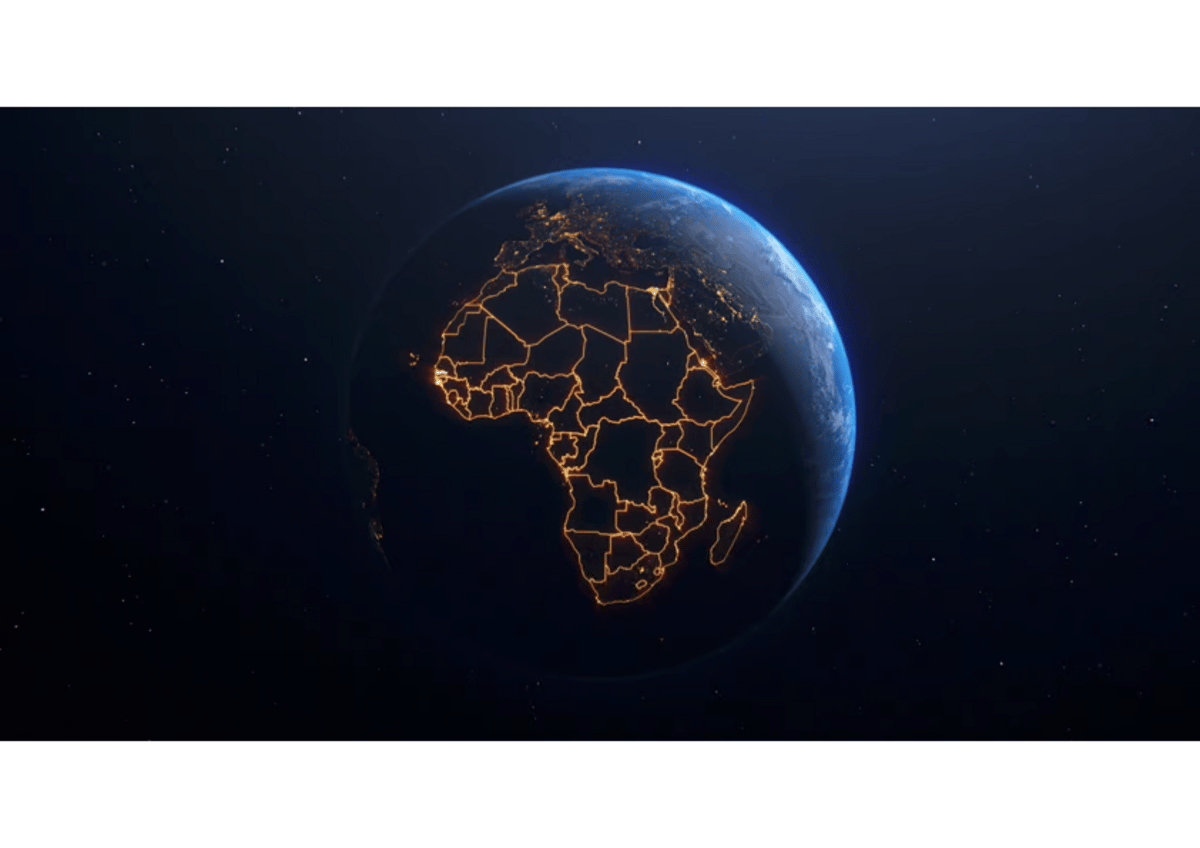Dear Friends,
Happy Friday. Here is your weekly Brief packed full of news and analysis from the continent over this past week.
Before jumping in, we would like to recommend a newly released read, Politics On the Edge, authored by friend of the Africa Brief, Rory Stewart.
Enjoy the reads.
Too Long; Didn’t Read
Africa Climate Summit. 20,000 participants gathered on African soil to formulate Africa’s response to climate change — an important development in the lead up to COP28 (Intrigue).
African Union (AU). The AU joined the G20 — a grouping which represents more than 85% of the world’s economy. Prime Minister Narendra Modi confirmed the AU's membership in the G20 is ‘on par with the EU’ (News24).
Algeria. Despite long-standing diplomatic tensions, Algeria is now opening its airspace for humanitarian and medical flights headed to Morocco in response to the aftermath of the horrific Sept. 8 earthquake (Foreign Policy).
Burkina Faso. Jihadists killed more than 50 members of the country's security forces. The insurgents have besieged more than two dozen towns and 1 million people. The militants are moving towards the country’s capital, Ouagadougou (The Economist).
Catalyst Fund. The firm closed its first fund of $40mil intended for investment in climate startups across the continent (TechCrunch).
Central African Republic (CAR). The country is facing a humanitarian crisis with 2.4 million people in dire need of assistance. The UN’s appeal for $534 million for the country is only 36% funded (AP News).
Egypt. Egypt’s President, Abdel Fattah al-Sisi, said the country needs to sharply reduce its birth rate from around 2 million births a year to 400,000 in order to prevent a “catastrophe”. He said people should not have the freedom to decide how many children to have (a nod towards China’s infamous one child policy)(The Economist).
Ethiopia. Abiy Ahmed, Ethiopia’s prime minister, said that his country had finished filling reservoirs for The Grand Ethiopian Renaissance Dam on the main tributary of the Nile river. The dam is expected to produce 6,000 megawatts of electricity, more than doubling Ethiopia’s current capacity. Sudan and Egypt, which both rely on the Nile for water, view the project as a threat (The Economist). See more below.
Libya. More than 20,000 people were killed in Libya after torrential rain caused two dams to burst near the coastal city of Derna, destroying much of the city and carrying entire neighborhoods into the sea, local authorities said (New York Times).
Mali. Armed secessionist groups in northern Mali attacked outposts controlled by the Malian army and the Wagner Group, in breach of a 2015 peace deal (The Economist).
Morocco. A 6.8-magnitude quake hit the Atlas Mountains in Morocco last Friday. Some 3,000 people have been reported dead (NYT).
Niger. “Armed terrorist groups” attacked a boat on the Niger river in north-eastern Mali, according to the country’s military junta, killing at least 49 civilians. Insurgents are seemingly exploiting the disarray amongst the Wagner Group following its leader's, Yevgeny Prigozhin, assassination.
Pfizer. Disclosed contracts show how the American pharma giant bullied the South African government into paying more than the EU for its COVID-19 vaccines as well as strong-armed the country into signing some demanding conditions (Politico). See more below.
Rwanda. Kigali has signed a deal with a German-Canadian start-up to build a small civilian nuclear reactor. Rwanda signed an agreement with Russia's nuclear agency Rosatom in 2019 to set up a nuclear power plant by 2024 (Africa News).
Sudan. Four months after being told by Sudan’s government to leave, the UN’s top envoy in the country resigned and used his parting words to denounce the warring parties’ indiscriminate attacks on civilians (Voice of America)
Graphic of the Week

Source: Economist Intelligence Unit
In Context: According to the EIU, China’s interest in natural resource investments has evolved to become more systemic. The country is pursuing a strategy to diversify imports and to compete in the mining market. Priorities have shifted with agricultural commodities and strategic minerals like lithium, cobalt, and nickel now taking precedence over coal. China continues to expand its reach across the continent’s mining sector. Despite serious investment it continues to play a minor role compared to regional giants and Western-aligned multinational mining companies, with incumbents like Glencore, AngloAmerican, and Rio Tinto retaining dominant positions (Economist Intelligence Unit).
Business & Finance in Africa
Starting at the macro level, the Economist’s Intelligence Unit (EIU) released its updated Global Economic Outlook. The EIU forecasts that the global economy will continue to skirt a recession, growing by 2.3% in 2024, matching the rate projected for 2023. Foreign direct investment (FDI) into Africa will remain constrained for the foreseeable future.

Source: Economist Intelligence Unit
In other news, Devex produced a special report on pharmaceutical companies troubling actions during the pandemic. In short, the report shows how pharma companies, through secret contracts, bullied the South African government with “hefty demands and conditions” to secure COVID-19 supplies. The report found that South Africa’s contracts with Johnson & Johnson and Pfizer, the main suppliers of COVID-19 vaccines to the country, included clauses that required permission from the corporations if the government decided to resell or donate the vaccines outside of the country.
Even worse, the contracts showed that South Africa paid much more for vaccines than wealthier European countries. The country paid the Serum Institute of India, a vaccine producer, $5.25 per dose of the generic version of the AstraZeneca vaccine, coming to more than twice paid by the European Union for essentially the same vaccine. It also paid $10 a dose for the Pfizer vaccine, more than the $6.75 cost price the African Union reportedly paid for it.
Moving on, Russian President Vladimir Putin says Moscow is weeks away from supplying free grain to six African countries (Zimbabwe, Burkina Faso, the CAR, Eritrea, Mali and Somalia) after scrapping a deal allowing Ukrainian food exports through the Black Sea.
On the other side of the planet, the Global Africa Business Initiative was held in New York with speakers including the African Union Commission Chair Moussa Faki Mahamat, U.N. Secretary-General António Guterres, and African Export-Import Bank President Benedict Oramah. US FDI on the continent is less than US$50bn as of 2022. For a continent of 54 countries, Africa has less US FDI than India which attracted just over US$50bn in 2022.

Source: Statista
Finally, Ghana’s sovereign wealth fund is set to invest ~$33 million in the nation’s first lithium mine. The investment will give Accra a minority 6% stake in a lithium mining project run by the Australia-based Atlantic Lithium (Reuters).
China in Africa
The South China Morning Post writes that Egypt and Ethiopia joining BRICS will help boost China’s influence in Africa due, in part, to the two countries occupying an important strategic position and having long-standing political and economic ties with Beijing.
In some hopeful news, Zambian President Hakainde Hichilema is on a state visit to China to negotiate debt restructuring. China is Zambia’s largest creditor.

Source: Reuters
Climate in Africa
According to the State of the Climate in Africa 2022 report, the continent suffered more than US$8.3bn in economic damages due to climate change last year, while more than 110 million people on the continent were directly affected by weather, climate, and water-related hazards (News24).

Source: Statista.
As if timed, floods swept through northeastern Libya killing more than 20,000 people and leaving thousands more destitute in the eastern port city of Derna (New York Times).
Democracy in Africa
Adding a graphic for you as part of our democracy section this week. Next year many African states will head to the polls to determine the trajectory of their countries, including large states like Ethiopia, Egypt, and South Africa.

Source: Economist Intelligence Unit
Health in Africa
The Africa Centres for Disease Control and Prevention (Africa CDC) and the government of France signed a memorandum of understanding (MoU) today to strengthen their cooperation in public health. France committed to support the Africa CDC’s efforts to build more robust public health systems and improve health security across the continent, with a focus on the development of national public health institutes, the enhancement of disease surveillance and emergency response capacities, and the promotion of local manufacturing of vaccines, diagnostics and therapeutics (Africa CDC).
Peace & Security in Africa
Water scarcity afflicts large parts of the African continent. It is most acutely felt in the Horn of Africa. This week, Egypt expressed anger after Ethiopia announced it had filled the reservoir at a highly controversial hydroelectric dam on the Blue Nile river. Ethiopia has been in an ongoing dispute with Egypt and Sudan over the megaproject since its launch in 2011. BBC News reports that it believes the Grand Ethiopian Renaissance Dam (Gerd) will double Ethiopia’s electricity output — currently half the 127 million population lacks electricity. But Egypt and Sudan both rely on the Nile for nearly all their water needs for agricultural, household, and industrial purposes. The Egyptian Foreign Ministry said Ethiopia's ‘unilateral’ filling of the reservoir violated a declaration of principles signed by the three countries in 2015, and it branded Ethiopia's action ‘illegal’. ‘The declaration of principles stipulates the necessity of the three countries reaching an agreement on the rules for filling and operating the Gerd before commencing the filling process,’ the statement said (BBC). Watch this space closely.

Source: The Economist.
Tech & Society in Africa
The Catalyst Fund closed its first fund of US$40 million intended for investment in climate startups across the continent (TechCrunch). The fund enjoys commitments from FSD Africa Investments (FSDAi), Cisco Foundation, USAID Prosper Africa, and tech investor Andrew Bredenkamp. The Catalyst Fund is among the growing number of new capital pools focused on climate change in Africa. Others include Africa People + Planet Fund by Novastar Ventures, Equator and Satgana.
United States in Africa
A US government contractor has been arrested and charged with spying for Ethiopia (New York Times).

